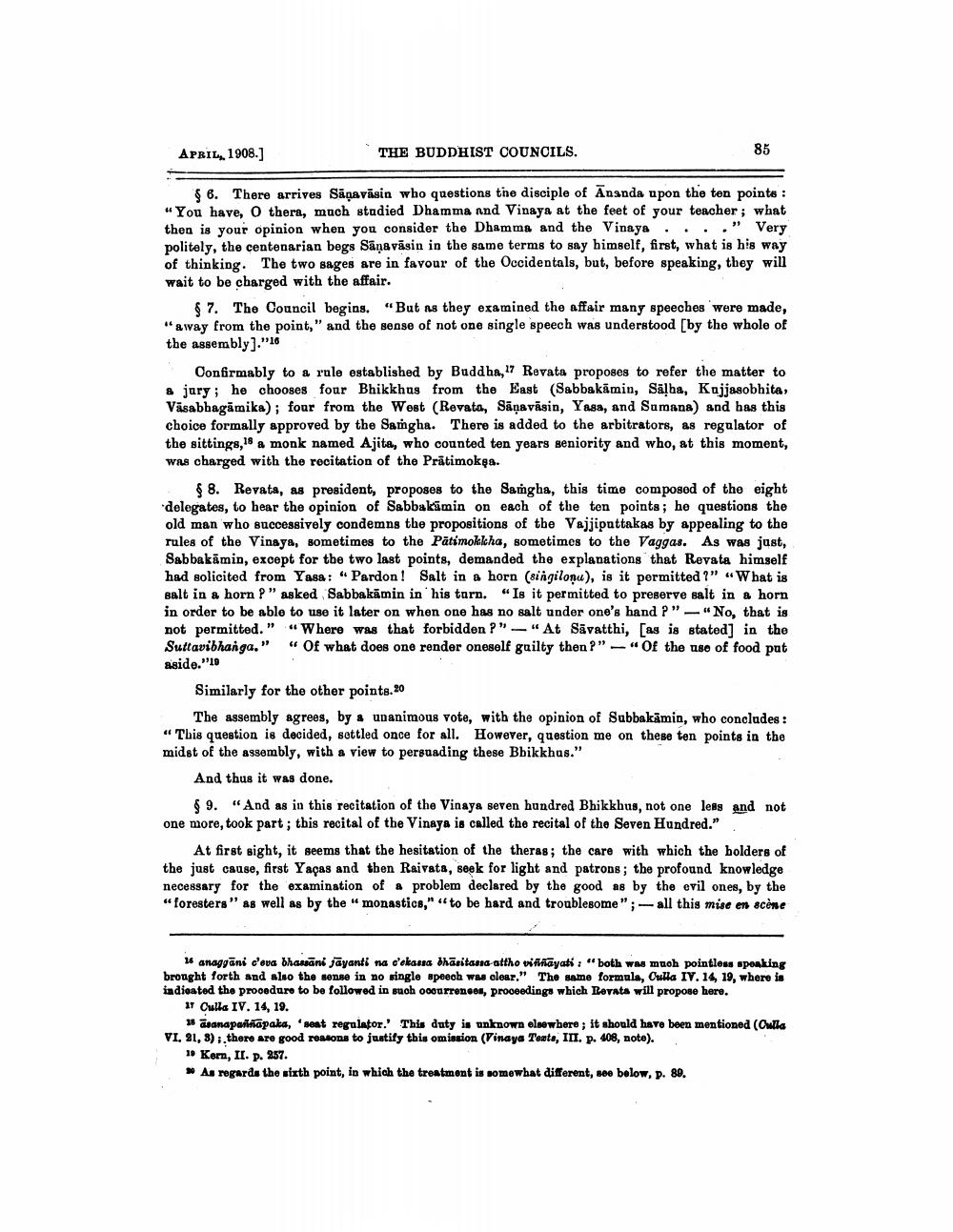________________
APRIL 1908.]
THE BUDDHIST COUNCILS.
85
$ 6. There arrives Sāņavāsin who questions the disciple of Ananda upon the ten points : " You have, O thera, mach stadied Dhamma and Vinaya at the feet of your teacher; what then is your opinion when you consider the Dhamma and the Vinaya ...." Very politely, the centenarian begs Sāņavāsin in the same terms to say himself, first, what is his way of thinking. The two sages are in favour of the Occidentals, but, before speaking, they will wait to be charged with the affair.
7. The Council begins. “But as they examined the affair many speeches were made, "away from the point," and the sense of not one single speech was understood [by the whole of the assembly]."'16
Confirmably to a rule established by Buddha,17 Revata proposes to refer the matter to & jury; he chooses four Bhikkhus from the East (Sabbakāmin, Sāļha, Kajjasobhita, Väsabbagāmika); four from the West (Revata, Sāņavāsin, Yasa, and Sumana) and has this choice formally approved by the Samgha. There is added to the arbitrators, as regulator of the sittings, a monk named Ajita, who counted ten years seniority and who, at this moment, was charged with the recitation of the Prātimokga.
$ 8. Revata, as president, proposes to the Samgha, this time composed of the eight delegates, to hear the opinion of Sabbakāmin on each of the ten points; he questions the old man who successively condemns the propositions of the Vajjiputtakas by appealing to the rules of the Vinaya, sometimes to the Pātimokicha, sometimes to the Vaggas. As was just, Sabbakāmin, except for the two last points, demanded the explanations that Revata himself had solicited from Yasa: "Pardon! Salt in a horn (singilonu), is it permitted ?" "What is salt in a horn P" asked Sabbakāmin in his tarn. "Is it permitted to preserve salt in a horn in order to be able to use it later on when one has no salt under one's hand ?" - "No, that is not permitted." "Where was that forbidden ?" - "At Săvatthi, [as is stated] in the Suttavibhanga," " Of what does one render oneself guilty then?""Of the use of food put aside."19
Similarly for the other points.20
The assembly agrees, by « unanimous vote, with the opinion of Subbakāmin, who concludes: “ This question is decided, settled once for all. However, question me on these ten points in the midst of the assembly, with a view to persuading these Bbikkhus."
And thus it was done.
8 9. "And as in this recitation of the Vinaya seven hundred Bhikkhus, not one less and not one more, took part; this recital of the Vinaya is called the recital of the Seven Hundred."
At first sight, it seems that the hesitation of the theras; the care with which the holders of the just cause, first Yaças and then Raivata, seek for light and patrons; the profound knowledge necessary for the examination of a problem declared by the good as by the evil ones, by the “foresters" as well as by the "monastics," "to be hard and troublesome"; - all this mise en scène
16 anagyāni c'eva bhausānijāyanti na c'ekana bhānitana attho vifitayati: "both was much pointless speaking brought forth and also the sense in no single speech was clear." The same formula, Culla IV. 14, 19, where is indicated the procedure to be followed in such currences, proceedings which Revata will propose here.
11 Culla IV. 14, 19.
» asanapatapaka, seat regulator.' This duty is unknown elsewhere ; it should have been mentioned (Cuilla VI, 81, 8), there are good reasons to justify this omission (Vinaya Teata, III. p. 408, note).
19 Kern, II. p. 257.
As regards the sixth point, in which the treatment is somewhat different, see below, p. 80.




